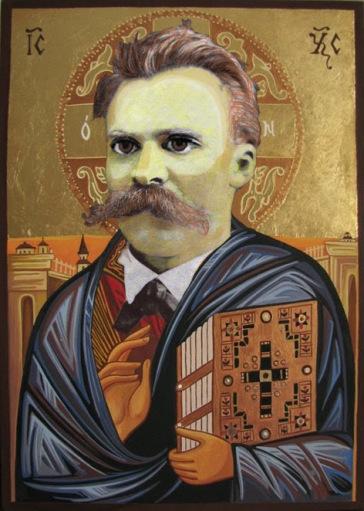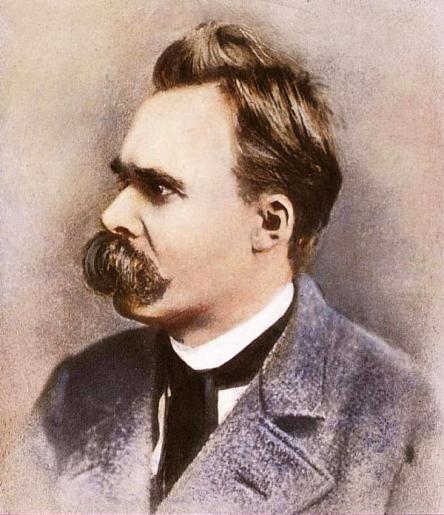
Perhaps no single author has been more misunderstood than Friedrich Nietzsche. Communists and Fascists, nihilists and deists alike, claim him as their own, and yet others of the very same allegiances ridicule him as an incomprehensible, even sickly scourge. No clearer intellectual critical divide is known to history regarding one single thinker’s philosophy more than that regarding Nietzsche’s, and perhaps for no one else is there such an equal amount of critics and commentators disagreeing with each other as to whether he be a genius or a madman. Rather than to show point by point where his readers have gone wrong, something needed but which will not be attempted here, I will summarize the problems by concentrating on one big myth regarding Nietzsche, that being that he is a nihilist and atheist. Here I will demonstrate to you that Nietzsche was no nihilist, but rather a lover of life, and furthermore, that he believed in God.

I. Humanism, All Too Humanism
Today we here a lot about the word “humanism”. Nearly universally it is considered to be something antithetical to religion, when in reality a humanist may or may not be a believer in any deity. According to Google, humanism is:
“…an outlook or system of thought attaching prime importance to human rather than divine or supernatural matters. Humanist beliefs stress the potential value and goodness of human beings, emphasize common human needs, and seek solely rational ways of solving human problems”.
According to Wikipedia, humanism is:
“…a philosophical and ethical stance that emphasizes the value and agency of human beings, individually and collectively, and generally prefers critical thinking and evidence (rationalism and empiricism) over acceptance of dogma or superstition”.
Both of these definitions might serve to illustrate the wrong but popular conception of humanism to which I mean to call attention, and which by analogy compares to the understanding of Nietzsche regarding God. Both these understood meanings of humanism are correct except where they imply that belief in a Creator is disallowed. In actuality, and according to how the word was meant to be used by the people who first used it, humanism is a pursuit for Truth that emphasizes benefits to mankind, an endeavor which may or may not involve a Supreme Being. It is an approach to life based on classical studies, a human-centered approach to The Good Life.
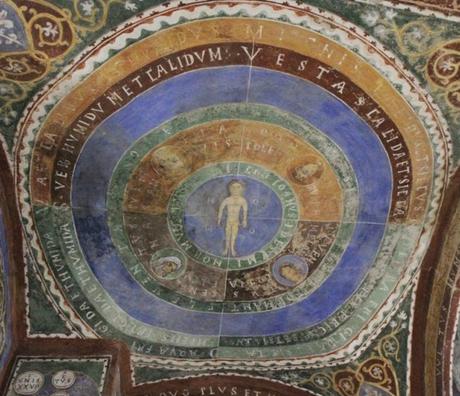
A humanist, by this definition, is first of all a champion of human rights, such as life, liberty, freedoms of speech and expression, and so on. The world is Human-centered, everything is for and revolves around individual human beings. Whether one believes in God or not makes no difference as to whether or not one is a humanist, and so it is somewhat sad that today the word has become synonymous with “atheist”, and treated as antithetical with regard to metaphysical matters. In fact, the greatest known humanists of all time have been believers in God.
Now, in the same way that the common, accepted belief is that humanism is atheism, the common, accepted belief is that Nietzsche was a nihilist, and did not believe in God. The main reasons for these erroneous but popular misconceptions involve his being quoted out of context, or out of certain texts more or less ruined by his sister and other “editors”, and in order to lend support for every unsavory cause from fascism to communism, sadism to masochism, nihilism to atheism, etc. In regards to both humanism and Nietzsche, setting the record straight will hopefully not only send you back to restudying the Prussian with royal Polish bloodlines, but also make you reassess your own evaluation of both humanism and the people who call themselves philosophers and scholars.
To prove this it will be necessary to first define what is meant by “God” and, because this will require a look at the history of the concept, the next few sections will of necessity be a bit lengthy. Be advised I will actually be leaving out a lot of information in order to shorten and simplify things.

II. Which God Died?
In this day and age, where the term “God” can be applied to any type of being or non-being and remain, if not in concept, at least in name the same, it is first necessary to make some distinction between what is and is not meant here by the term. The popular conception is that since at least Plato men have felt it necessary to separate their epistemological, psychological, ethical, and aesthetic views, in a word, their philosophies, from those held and promoted by myth and other religions.
Many cite this desire to know without invoking God as, the reason behind the development of Science, for example, the quest for objective Truth sought by Cartesian -style introspection. But in actuality, what Descartes did for popular thought was bring back into vogue the type of thinking known since BC times. We can read of this thought today under the headings “Presocratic Philosophy”, “Platonic Thought”, “Eastern Philosophy”, and so on. Of Descartes in particular, the father of Modern Philosophy, it is more accurate to say he was the first major thinker since the birth of Christ that dared to challenge established conceptions of God and the Universe. When the ancient and initial benevolent God and Creator, or at times, Gods and Creators, became instead oppressors and demanders, and more about death and punishment than Life and benevolence, a Descartes was required.
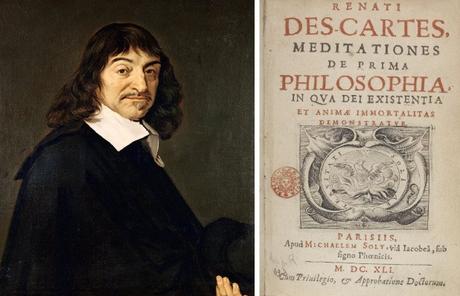
Nevertheless, rather than trace the idea of God from the ancients to today, which space here, and my stamina, will not allow, I will begin with the intellectual rejection of the Scholastics, an enterprise known as Modernism, which today’s scholars consider a historical movement composed of Empiricist and Rationalist Philosophies.
The classical idea of God may be understood as the ultimate Creator. According to The Spirit Of Western Philosophy (Stallknecht And Brumbaugh, 1964):
The personal God of Christianity is described as the Supreme Being. He occupies the highest position in a metaphysical scheme like that of Plotinus. God alone possesses full and perfect reality. (207)
This definition of what is meant by the concept “God” is one fairly universal among most religions and belief systems in the world. The God of the Scholastics, however, which would drive the Modernist revolution, went quite a bit further:
No creature has the right to say ‘I am that I am’. This is because creaturely beings are not self-contained, they depend for their existence on other things. (ibid.)
Here we begin to see that against which Cartesian philosophy, and its contemporaries, rebelled, if more by example that demonstration. Historically some conception of deity existed for most people prior to Christianity, be it as Prime Mover, first cause, Nature, Infinity, or some anthropomorphic figures like Zeus, Jupiter, Brahma, or a Mother Goddess. The Christian, or we should say Roman-ized Christian influence, established a hierarchy among beings, made God into mostly a bestower of punishment, and the later centuries would use this allegedly God-based authority to impose all kinds of prohibitions and inflict all kinds of horrors on unorthodox believers and unbelievers alike, all in contradistinction to the words and the life of Christ himself. In the end, mankind wanted to know why he could not also describe himself as “I am that I am”. After all, is it not true?
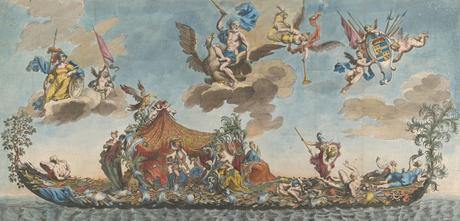
Prior to these Scholastic developments the world had believed mythology was simply mythology. Zeus was not really sitting on a cloud throwing thunderbolts down as lightning, nor did he or his ilk really take human form and impregnate Earthly women, fair daughters of man or not. Prometheus was not really tied to a mountain to have his liver eaten daily by a bird of prey any more than the real Sisyphus might be seen rolling up a mountain the same boulder which will roll down again by the end of the day. Even in their time, these myths were understood in their metaphorical sense, as symbols meant to produce within the listener understanding of, and empathy for, the particular human condition addressed by the story. With the advent of the dogma of Christ (great book), however, men were being told, against their better judgment, and under threat of punishment and even death for non-belief, that these ancient tales and myths were not only “barbaric” and “wrong”, but sacrilegious as well. The thinking individual was made, better to say forced, to believe God was actually here, on the Earth, in the form of a man, born of a virgin from divine seed.
Complicating matters even more is the fact that the earliest followers of Christian philosophy, such as the Essenes, had an entirely different conception of Christianity, one which barely resembled the religion it would become. By the time of Augustine, Aquinas, and the other Scholastics, Christianity had escaped the darkest ages of its dominance, but was still in many ways more oppressive than helpful, and would remain so until the Renaissance. As Erich Fromm puts it in Dogma Of Christ:
The concept of Jesus held by the early community was that he was a man chosen by God and elevated by Him as “messiah” and later as “Son of God”…in only two ideas of faith do we find something new: in the fact of his exaltation as son of God to sit at the right hand of The Almighty, and in the fact that the messiah is no longer the powerful victorious hero, but his significance and dignity reside just in his suffering, in his death on the cross. (52, my emphasis)
Fromm, ever the psychoanalyst, believed that the elevation of man to God on the part of later Christians was an “unconscious wish for the removal of the divine father” (ibid. 54). If people, with right living, could be gods, then “God was deprived of his privileged fatherly position of being unique and unreachable” (ibid. 54). But of course belief in God does not imply making one’s self into God, and here Fromm read perhaps a bit more into ancient religious practices than the evidence warrants.
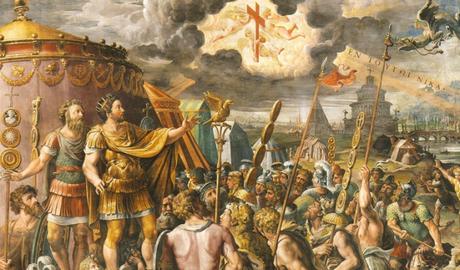
Nevertheless, as Christianity grew in scope from its more traditional beginnings it eventually evolved into, even transformed, into a rigid set of dogmas that was to be the direct object and cause of Cartesian introspection and doubt. Eventually the (now Holy) Roman Empire, under Constantine, was to embrace it and spread it throughout all its colonies:
About the middle of the second century, Christianity began to win followers among the middle and higher classes of the Roman Empire. Above all, it was the women of prominent position, and merchants, who took charge of the propaganda. (ibid. 59)
Resulting from this aristocratizing of the original Christian thought was that from the third century on, through among other things the inaccuracies of “word of mouth” renditions and the problems with translation, the primal Christianity was transformed into a completely different theology, philosophy, and religion. No longer was Jesus a man elevated to having God-like status, now there was an actual God who had descended to become Man.
The original Gnostics denied Jesus was a real man. The later apologists would add that God is not the originator of the world, but only the personification of divine intelligence, and for this theory the Pre-Socratic Greek concept of the Logos was adapted to fit the bill. What the Greeks had explained as the order of the Universe, and the factor behind human communication, had become altered to mean the Word of God.
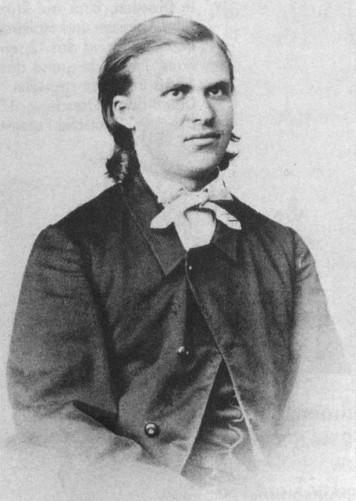
Dogma is, according to many psychologists at least, an expression of compulsive thinking, ritual, or some other action. When people have no unifying cultural thought pattern, or overriding archetype, or reasonable or scientific explanation, dogma is what arises to fill the gaps. The Scholastics and theologians prior to Descartes used the corrupted idea of Christianity to bring forth a doctrine of beliefs and shalt-nots that had, as its main attraction, a special place in the afterlife for the weak, the meek, the cowardly, the poor, the downtrodden, and the diseased. It was Judaism for the Gentile masses. Now, thanks to the doctrine of repentance, and the belief that Jesus Christ died on the cross to redeem human sins, even the admitted, most wretched sinner (like Augustine and Paul, for instance…) need but accept Jesus as his Lord, confess his sins to a congregational superior, and then his place at God’s feet, in an afterland of gold, could be secured. Such a dogma was appealing, and unifying, to many, but poison and even insulting to growing and expanding rational minds.
Well, Descartes broke completely with the Crusading religious imperialism of the Middle Ages “and he made his independence explicit” (Stallknecht, 240). Influenced by thinkers like Pythagoras, Euclid, Plato, Augustine, Copernicus, Kepler, and Galileo, Descartes dared to attempt to restore rationality to the human mind by emphasizing man’s connection with – not hellfire and brimstone separation from – the Almighty God. He was “inspired by the thought that the human will is absolute and master of its situation” (ibid. 252). Even though students of history know this is the classical understanding of Man’s relationship to God, such thought as this was, to the Scholastics, high treason, even blasphemy.
The Scholastics believed that what Man endures is decided by the grace or wrath of God, in a word, by fate, or destiny. Without nullifying totally the concept of the omnipotent, omniscient, omnipresent God, Descartes challenged this dogma of determinism by affirming and even emphasizing the existence and value of human free will. In fact, for Descartes it is only by extension of this free will that Man, through reason, can come to know God. In Discourse On Method (in The Rationalists, Doubleday, 1960), he wrote:
What is called good sense, or reason, is by nature equal in all men…the diversity of our opinions, consequently, does not arise from some being endowed with a larger share of reason than others, but solely from this – that we conduct our thought along different ways, and do not fix our attention to the same objects. For to be possessed of a rigorous mind is not enough; the prime requisite is to rightly apply it. (39)
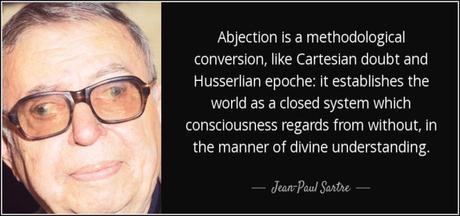
Descartes’ Method of Doubt, also known as solipsism, by which he would strip himself of everything he thought he knew to see what he could know for sure and beyond doubt, left him epistemologically bare except for knowledge of two things – himself, and God. Based on these assumptions, he would build his philosophical system. The first, the knowledge of self, the “cogito” or “I think” as it is called, Descartes said was placed in him “by a nature which was in reality more perfect than mine…which was God” (ibid. 64). Hence God exists, as does Descartes.
Man is thus connected somewhat to God, at least an extension of God, which Descartes considered a divine being. He said about this divine being:
All the things which we clearly and distinctively conceive are true [and] certain only because God is or exists…our ideas or notions, which to the extent of their clearness and distinctness are real, and proceed from God, must to that extent be true. (ibid. 67)
God is a substance “infinite (eternal, immutable), independent, all-knowing, all-powerful, and by which I myself, and every other thing…exists” (137). Although this idea stems from Augustinian tradition, and despite cited evidence to the contrary, such as Descartes’ letter to the priests in the beginning of his Meditations, it would be a mistake not to recognize how different his ideas were from the Christian dogma popular in his day. At the time his views were very unorthodox, and his attempt was to logically, by reason and rationality alone, prove the existence of God. He gave both the classic cosmological and ontological proofs for this Godly existence, and assumed a reality behind the idea of God in his mind:
The thinking thing [res cogitans] is for Descartes a purely spiritual substance. It is not a body or living organism that thinks. Thought – and accordingly the thinker – is absolutely unextended. (Stallknecht, 26)
Compare the res extensa, or extended things, which have length, breadth, extension in space, and so on, with this res cogitans, or objects of thought, which have no such phenomenal or 3D reality and exist only, like Platonic ideas, in the mind.
Therefore, to Descartes there is a portion of God, the nous or mind, or thinking portion, that is manifest a priori, that exists innately in the human psyche. This being so, religious dogma and blind ritual (and obedience…) then are not the keys to comprehending or knowing the divine. Descartes thought, on the contrary, that it is by the power of thought alone that such knowing of God may be accomplished. That there are separate extended things and things of thought, or two different types of objects of knowledge, is one foundation for the type of reasoning that was to become called dualism.
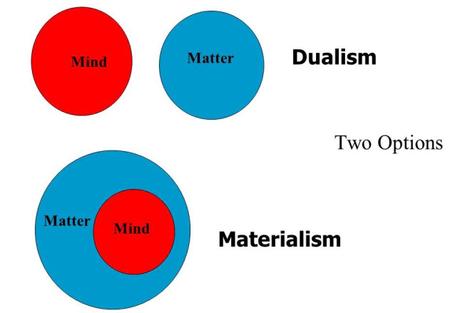
Some misconceptions have arisen resulting from this dualist understanding, most of which concern the possibilities of interaction between these two types of extended and thinking “things”. If the human soul and/or mind are examples of thinking things, mental things or things of the mind, and the brain and the body are extended or physical things, how is that they can communicate one to another, something which our living day to day assumes must happen. Well, it is often forgotten by the critics of this Cartesian dualism, that Descartes “had been very close to the Spinozist [i.e. pantheistic, monist, Vedic] solution when he asserted that God is the only true substance” (ibid. 277). Not only is this true, but what Descartes believed was nearly identical in understanding to the ancient ideas of God from Greek times and before. If the only true substance is God substance, and God is a mental substance, then it is the mind which is the most real of all, and such an understanding is nothing less than a restatement of Plato’s doctrine of the forms, which if you remember stated that the form or the idea (eidos, idea), is more real than the changing phenomena, the representations of these ideal forms in the world. We see here that after 2000 years there remains an idea of God consistent throughout the ages.
Even Spinoza the “monist“, often contrasted with Descartes the dualist, may be seen as following a similar tract. Spinoza said that when he uses the term “God” he means an infinite being, “a substance consisting in infinite attributes, of which each expresses eternal and infinite essentiality (Ethics, in The Rationalists, Definition VI). In the alleged “drastic move” from dualism to monism, another false dichotomy, there is merely a seeing of the very same transcendence only from different points of view. In Proposition XVII of the Ethics, Spinoza says that “God acts solely by the laws of his own nature, and is not constrained by anyone”.

According to Spinoza, supposedly contrary to Descartes, God is identical in essence and existence and He cannot act in any other way than he does. For Descartes God is free to act as He chooses. But although Descartes says God has free will, indeed is the cause of human freedom as well, both agree God is identical in essence and existence, and both agree things cannot happen any other way than they do. Spinoza’s attempt to debunk Descartes is further hampered by his own assertions that God’s intellect “in so far as it is conceived to constitute God’s existence, is, in reality, the cause of things, both of their essence and existence”, and that God is “the indwelling and constant cause of all things” (see The Rationalists 195-196). There can be little doubt that the idea of God, as understood by both Descartes and Spinoza, is one and the same.
I will use an analogy to prove this last point. By the act of my writing this essay, am I using my free will, or am I rather living out a pre-determined process? What seems like a simple question, one pertinent regarding nearly all human action, is difficult to answer, and was even considered insoluble by no less an intellect than Immanuel Kant. The truth is that whichever doctrine I choose to accept – and I accept free will because it at least appears or seems like I make my own choices – nevertheless the fact remains that I am indeed writing this paper, and doing so takes conscious effort. By my performing these actions with full conscious awareness, by being aware of the effort’s progression as well as my personal participation in it, and by being able to at any time wad up these papers and trash the whole idea instead, I must conclude that free will is a proven empirical fact. Yes, the results of this endeavor could not turn out any other way than they will, but that does not mean I did not make this effort happen. I am at least its direct cause.
So while Descartes and Spinoza are said to have imagined God to exist in different ways, all we need to recognize is that they both acknowledge a Supreme Power evident to the mind, and are really just describing two necessary sides of the same metaphysical coin, related to one another “as the convex and concave ‘sides’ of a curve, as two genuine aspects of one and the same thing” (Stallknecht, 277).
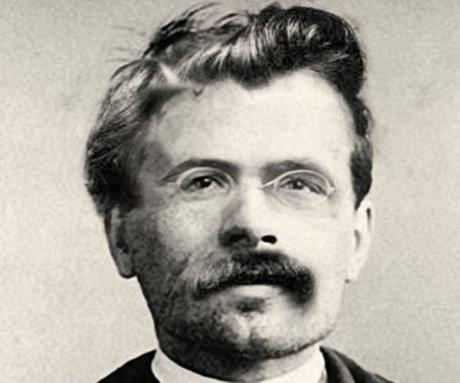
III. The Nature Of God
The dualism of Descartes descends from a line of philosophical thought ranging from Plato and Aristotle through to Aquinas and the eventual “idealism” of Leibniz, Berkeley. Fichte, Kant, and so on. Monism such as that of Spinoza may be seen as having its ancient origin in philosophies such as that of Heraclitus, coming to us in history through the writings of the Stoics, and continued to the present day from the works of thinkers like Schelling and Schopenhauer, Nietzsche, Bergson, and the “existentialists” such as Sartre and Kierkegaard. I will concentrate the effort here on the “left wing” of what is Will Durant’s “philosophical tree” (see image below) so that I may eventually arrive at Nietzsche. Regarding thoughts on God, begrudgingly I will have to, for the sake of brevity, omit many important empiricists and idealists, but if this topic of the meaning of God interests you further, I can suggest Lucretius, Francis Bacon, Thomas Hobbes, JS Mill, David Hume, Herbert Spencer, William James, Bertrand Russell, and even CS Lewis as good beginnings.
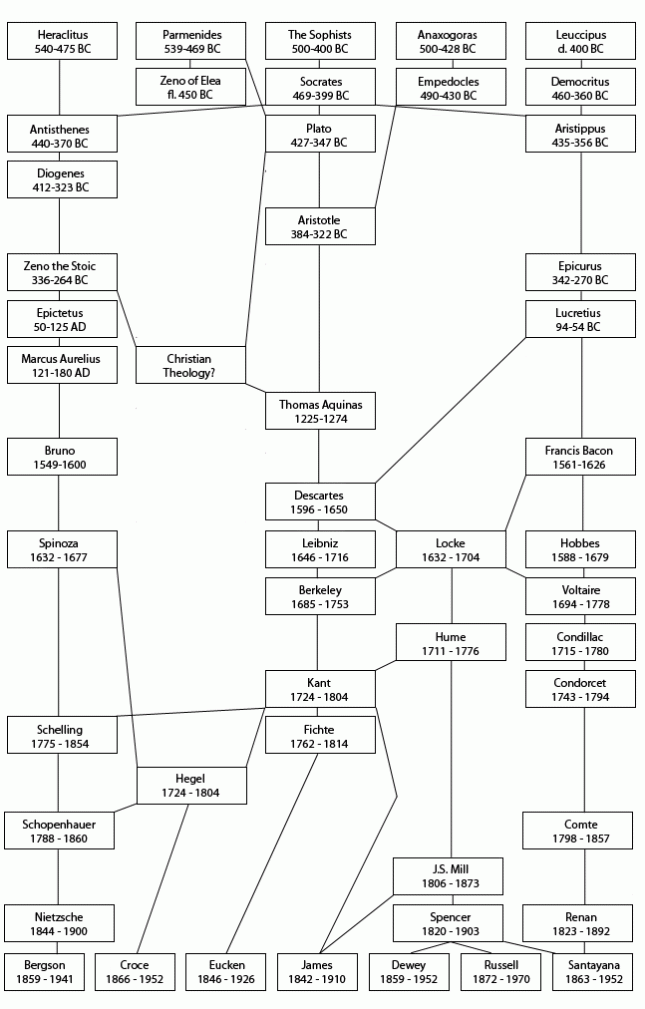
Any attempt to trace the history of the idea of God must eventually tackle the questions posed by the common historical allusions to the concept, or idea, of “Nature”. This Nature has stood as a surrogate or prosthetic for God in many otherwise atheistic or God-less philosophies. As point of fact, many thinkers have used this Nature concept as a causal factor, and as such use it as a synonym for, and as interchangeable with, the idea of God. A few moments then must be spent in defining this Nature.
Aristotle wrote of, and defined, a word called phusis. He gave seven meanings for this term, which is from where we get our present word “physics”. The seven meanings are:
- Origin, or Birth
- Source of Movement, or Change
- The primitive Matter out of which things are made
- The Essence, or Form, of natural things
- Essence in general
- Essence of the self-caused
- God, or Deity
Most important for us is that Aristotle said that number seven, or phusis or physis meaning God “encompasses all the others by definition” (see Collingwood, The Idea Of Nature, 81, e.g.). Today, we have translated this word directly as “Nature”. So, here we have our first historical confirmation of the identifying of God with Nature, although some hints at this were already in the world by the time of the Pre-Socratics, 500 BC or so. Moreover, if we consider Aristotle’s seven definitions all together for this “phusis”, then Alexander’s tutor’s idea of Nature or God, if but for him a Prime Mover perhaps, is nevertheless, ontologically speaking, basically the same as that offered by Modernists like Spinoza and Descartes. Aristotle being one case in point, but representative of other similar worldviews, it seems that many times, when theorists speak of Nature, they are nevertheless acknowledging still a transcendence behind human activity. The point to remember here is that religion, or the organized, ideological explanation of this transcendence, in its true form, is evident, and can be evidenced, independent of any particular dogma or mythology. When you hear the word Nature, especially when it concerns causation, you can bet your bottom dollar this is just a pseudonym, and stand-in, for God.
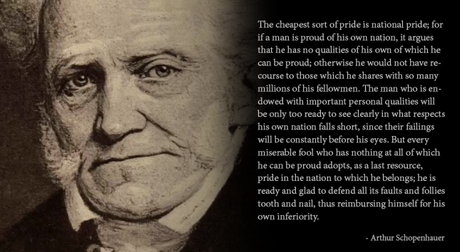
IV. Schopenhauer’s Influence
Arthur Schopenhauer is often cited as one of history’s greatest pessimists but was, as well, one of the most underrated thinkers of all time. He combined wit with genius and a quick-paced writing style uncommon especially in his time and in his native Danzig, Germany, now somehow, after WWII, located in Poland. Schopenhauer’s philosophy emphasized the importance of art and the primacy of the will, and he defined religion as the “Metaphysics of the Masses”, predating Marx’s mass opiates. It was these ideas of Schopenhauer, more than any of the other of his influences, that was to most drive Nietzschean thought.
Despite his often being at odds with religion, in his later years Schopenhauer began to see the positive significance of religious and ritualistic-type practices, and rightly wrote in his World As Will And Idea that “The controversy which is so…carried on in our day rests on the failure to recognize the allegorical nature of religion”. Here is the distinction between real religion and fake religion, true God and sham God, that Nietzsche would later expand into his literary corpus.
For Schopenhauer, ultimate wisdom is very similar to the Sanskrit and Vedic ideals, and involves concepts such as Nirvana and Oneness. Such thought is found today in Eastern religions such as Buddhism, Taoism, Zoroastrianism, and Hinduism. He understood Nirvana, for instance, as a “coming into being”, and as becoming one with the “world-will”, which bears a direct relation to the Oracle at Delphi’s mandate to “Know Thyself”. The ideas Nietzsche would rebel against were not those concerning “God”, per se, and definitely not those of Nature, but rather his diatribes were directed at the decidedly non-righteous and non-religious charlatans pretending to be doing God’s work.

While he influenced Nietzsche positively in many ways, Schopenhauer’s envisioning a state of affairs where the will is obliterated, the goal of nirvana, or for the Vedic religions and some Muslims, moksha, was to infuriate Nietzsche, and triggered his voluminous celebration of the human will. If you consider that Schopenhauer saw death, like many do, as a “release” from the good-evil, light-dark, good-bad “perilous dichotomy” of life, factors which were to contribute to his being called a pessimist, you will begin the understand what Nietzsche was to call a denial of Life.
Indeed, here it is, in Schopenhauer’s bringing to the Western world the asceticism of the East, that we might find the seeds that brought forth Nietzche’s Maxims and Arrows. Schopenhauer too often appears a man confused about the distinctions Christianity makes between the man who is good because he believes in the popular conception of God and the man who is good but holds no such belief. Schopenhauer in fact “feared society” and the reason was because of all the hypocritical actions he saw all around him. He had studied religion and saw the ways one in particular was turning his fellow men and women into mindless automatons. “He longed for peace, and everywhere he saw strife” (Durant, 261).
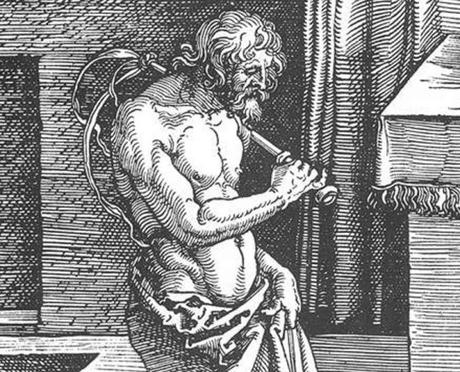
Like the Brahmin spoken about by Voltaire, it seemed to Nietzsche, probably rightly so, that Schopenhauer was giving up, so to speak, and was choosing blissful ignorance rather than unsettling and, perhaps, uncertain knowledge. To make it short and concise we can say that both Nietzsche and his mentor Schopenhauer both rejected the Christianity of their day because they saw in it anti-religious sentiment! Their argument runs something like this: Who is more worthy of Life, the pious denier of it, or the thinking embracer of it? Who more celebrates the works of God? Verily, the main idea behind the “to hell with religion” attitude erroneously taken (or understood…) as atheism is that if these people are the ones going to “heaven”, then I will take my chances in “hell”.
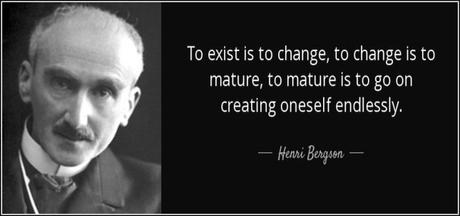
V. Bergson And the Human-Centered Universe
Summing up the classical understanding of religious belief, and the subjectively understandable idea of God, Henri Bergson wrote that:
We must go beyond both points of view – mechanism and finalism – as being, at bottom, only standpoints to which the human mind has been led by considering the works of men…there is a design in things, but in them, not outside, an “entelechy” – an inward determination of all points by the function and purpose of the whole. (ibid. 343)
Although he follows Nietzsche chronologically, I present Bergson first because of the amount of light he sheds on the too-often misunderstood Nietzschean philosophy. Bergson insisted, for instance, that the various philosophies the world has seen have had more in common than they have held apart, and said that philosophy can only progress by taking the “modicum of truth” each has to offer and combining these truths together to establish a more coherent philosophy of Man. While at first glance it might seem that any talk of a “coherent” or “consistent” philosophy, or system of any kind, would actually be inconsistent with Nietzsche’s position, such criticism may be parried by mentioning that, if this system be in constant flux, driven, as Feyerabend would later say, by “the spirit of anarchy”, then such a philosophy could surely be reconciled with Nietzsche’s beliefs.
All the different philosophies and theologies concerning God can be seen as separate subjective interpretations of a singular idea of transcendence which some have called, or have given the name, “God”. This God is noticeable, as I have tried to show here, under many different disguises. Nature, Prime Mover, Logos, Universal Mind or Mind itself, Natural Light, Supreme Being, First Cause, and so on. It is primarily a power, an energy, and this Power may be observed in action as that which causes all literal and figurative seeds alike to sprout, and in animals, which begins the heart’s beating and, more than that, it is what causes our mind to notice the germination, birth, or endeavor, and try to find out “Why?” and “How?” Human beings are then representatives of deity in, if nothing else, their persistent desire to create. This is hinted at by Bergson:
God and Life are one. But this God [each individual’s concept of God…] is finite, not infinite – limited in [I would say rather, “because of”…] matter, and overcoming its inertia fully, painfully, step by step; and not omniscient, but groping gradually towards knowledge and consciousness and “more light”. God, thus defined, has nothing of the ready-made; he is unceasing life, action, freedom. Creation, so conceived, is a mystery; we experience it in ourselves when we act freely, when we consciously choose our own actions and plot our lives. (ibid. 346)
This God being being defined as the total sum of human experience, no less and no more, is an attempt by Bergson to reestablish Man as as the ultimate creation and center of the universe, a worldview that had been mostly buried since at least the Copernican Revolution. Along with William James, Chateaubriand, William Blake, as well as Nietzsche, Bergson was part of a movement, a Romantic-style protest against standard thinking, a protest to be understood not as against thought or reason as a way to enlightenment (as it is often portrayed…), but rather as against those cognitive enterprises that would demand of Man a type of computer-programming way to knowledge which requires accepting data as true and then calculating equations. True thought, they believed, must question even the data – the premises – and what is meant by the phrase “the human ability to reason” itself. This way of thinking emphasized creation as a defining human ability, and is, I suggest, the predominant guiding principle in the works of Nietzsche. The significance of this here is that what God is, meaning as any of us know or deny Him, has always been, and must always be, the result of his being interpreted through the screen of the rational human faculties.
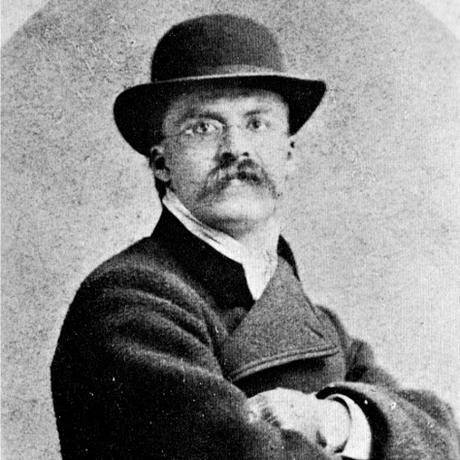
VI. The Birth Of A Nietzsche
Friedrich Nietzsche was born on October 15, 1844 in Röcken, Prussia, the son and grandson of Lutheran ministers. His first book, The Birth of Tragedy Out of the Spirit Of Music, is often misleadingly shortened to Birth of Tragedy (1872), as while it is true that in it Nietzsche discussed some classic Greek tragedies, a very large part of it also involved music, particularly that of Richard Wagner. In this work of genius Nietzsche brought to the forefront of scholarship and criticism the “Dionysian” elements of humanity, such as passion and desire, whereas before him most historians and critics de-emphasized this aspect of Man in favor of emphasizing and elaborating instead on the “Apollonian” – meaning the cerebral, or rational – distinctions of human nature. Indeed, perhaps nothing was both more original and more controversial at the same time than Nietzsche’s handling of the arts, in particular his delineation and explication of the opposing Apollonian and Dionysian aspects of Man. Right brain-left brain, emotion vs. reason, spontaneity vs. careful analysis, classicism vs. romanticism in art, all these and many more dual-aspects of the human reality, if not invented or established by Nietzsche, became elevated by his works, beginning with this book, to subjects of serious scholarly and theoretical consideration. It seemed to Nietzsche that the thinkers of his time forgot about the human qualities of passion, emotions, power, and the other “natural” or “animalistic” virtues. His contemporaries dedicated most of their time and research instead on the mental aspects of existence, and he thought this was a mistake, in fact a denial of a very important “primal” aspect of human nature.
Nietzsche’s works, if read in order of their appearance, give us clear indications as to the progression of his theories and ideas. In Birth, for instance, we see distinctly Nietzsche’s own solipsism, his own desire to try and find out the things he can know for sure, unprejudiced and from all points of view. Rather than to simply look at the “presented” face of the play, prose, poem, artifact, or other object of inquiry, Nietzsche endeavored to sort of flip everything around, to see, expose, and analyze the “other side” of these stories, relics, and theories, the aspects never really presented to the public, the sides often ignored, or omitted as undesirable, or inconsistent with certain worldviews or paradigms.
The importance of such a perspective can hardly be overemphasized, especially for anyone who wants to understand fully what is meant by – and what might be – literary, artistic, scientific, political, and even athletic genius. It even has much to say about aesthetic issues, the notions of beauty, for example, and the criteria of what makes something art. Consider how we have in the past studied the moon. As long as we limited our inquiry to what others have said, and what we had revealed to us about it, at one time we only really knew at best half of what was true, at worst a whole lot of speculation. That is, as long as we believed that round, luminous object in the night sky was object of awe, or as having direct influence on life on Earth and even human behavior, it seemed to us as something unapproachable, even divine. As we really began to study it fully, and circled around it actually and metaphorically, “peered into it” we could say, it became more completely revealed, and thereby we came that much closer to discovering what it really is, as well as what else it could be, such as a celestial body, an influencer of tides, a meteor interceptor, astrological influence, Jules Verne novel topic, prospective location for human travel and colonization, and so on.

Because of the amount of hastily accepted summarizations presented to the people as fact in his time, claimed facts that is, which often did not tell the whole story, Nietzsche emphasized the “other” side of things, like the art of devil’s advocacy applied to discovery. In order to arrive closer to the “truths” about the things we encounter he believed we must dare to see those things through new viewpoints, unique perspectives, and by using mental processes working in and from unconventional directions.
Here we find the first iterations of what is said to be the primary Nietzschean thesis, that ultimate Truth, as in the first cause of all things, can never be found. Scholarship, nearly to a man, therefore has labeled Nietzsche, among other things, a skeptic, a nihilist, and an atheist, all of which, I assure you, and will continue to prove to you, are incorrect, and untrue – and not just because of his mastery of irony and usage of words. If we were to encapsulize Nietzsche’s reasoning, to perhaps try and see why he has been interpreted the way he has, it would go something like this: You see a flower, I see a daisy; we both see the same becoming, however, the same process of the same identical plant coming-to-be into the world, and would like to find out the cause of the sprouting and development. After some experimentation we discover that the flower develops from a seed sown a certain depth in a certain way, according to a certain pattern. We regress the process and assume that the seed came from a prior mature daisy, that from a prior seed from a flower before that, and so on. Eventually we postulate that at some point there had to have been one first seed from one first flower, and more than that, there had to have been some first act of this vegetative “life” that allocated energy of some kind to the formerly only potentially-alive assemblage of matter.
Nietzsche, we could say to make it short, truly does rebuke religious authority, and not just because he sees in it anti-religious sentiment, but also because of the inherent incomprehensibility of this life force. It is because so many think they know a God that is by definition unknowable, that Nietzsche rails against certain religions. In fact this belief that God is in most aspects essentially unknowable is a position espoused by many Eastern religions. This being said, Nietzsche’s prose must be understood essentially as poetry, as it because of this, along with his lack of a complete system, and sometimes allegedly contradictory ideas, that his being a philosopher or not has often been debated. Were we to be as true as he was, we would have to admit that few human beings delved more honestly into themselves than Nietzsche did.

VII. Christ And Ant-Christ
Not just because of his philological training, much of Nietzsche’s work centers on, and is written in, metaphor. It also makes large use of compound words and made up concepts, irony, aphorisms, and analogies, and he manipulates words, and purposefully uses them in ways that have more than one meaning, like some Rock and Roll lyrics. One also rarely reads Nietzsche the same way twice, a comment more about our understanding than any literary ambiguity on Nietzsche’s part. As there are some who believed or, still believe, that Prometheus grows a new liver daily, that Sisyphus just can’t stop pushing his burden every day, some also believe on hearsay alone that the character Zarathustra (the Persian name translated as Zoroaster and founder of Zoroastrianism) is the man Nietzsche, and should be taken literally, and as expressive of his ideas. This is the primary, foundational, and interpretative error most responsible for the misunderstandings so widespread and prevalent about Nietzsche’s philosophy.
In the beginning of his work The Anti-Christ, Nietzsche foresaw and warned against misunderstandings:
This book belongs to the very few. Perhaps not one of them is living yet. Maybe they will be the ones who understand my Zarathustra…One must be honest in matters of the spirit to the point of hardness before one can even endure…my passion. (in The Portable Nietzsche, Kaufmann, 568)
Whereas in Birth of Tragedy Nietzsche introduced his elevating of devil’s advocacy to an art form, with the publication of The Anti-Christ, which shocked many by the title alone, we begin to encounter his deeper ideas. Here also came the thoughts of a man whose understanding of the holy sanctity of spirit, and re-assessment of value, rang so true to so many that the uneasiness his contemporaries felt upon hearing it prompted immediate rantings and objections from the morally shocked. Here also, therefore, were the first misreads of what the man was saying. Knowing this, and ever leery of the opinions of the majority, Nietzsche wrote:
Why should an author feel obligated to accommodate himself to a power whose strength is merely in numbers? If he considers himself superior in his talents and intentions to [the average] spectator, why should he show respect for the collective expression of all those mediocre capacities rather than for the few members of the audience who seem the most gifted? (Birth of Tragedy, 1956, 73)
Thus began Nietzsche’s wonderful and needed diatribes against the herd mentality.
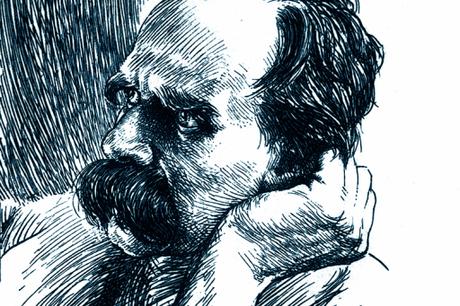
In the somewhat paradoxical style of Heraclitus, one of only a few people for whom he made his admiration known, Nietzsche believed human beings to be at once all alike, yet at the same time each a different, distinct, and singular human being. Also paradoxical is that no philosopher whose ideas were adapted for so many collectivist and social movements was actually more fiercely a champion of the individual than Nietzsche, the possible exception being Jean-Paul Sartre, and it is no coincidence considering the unjust applications of their work that both have often been criticized as not being “real” philosophers. Despite the selective usage of both men’s writings as support for everything from communism and fascism to atheism and post-modernism, the fact remains that, just like Sartre, Nietzsche refused to be pinned down, categorized, or made into one of any common herd. He was a champion of the authentic individual, something the “reluctant atheist” and also genius Sartre was to later concentrate on and make famous. Sartre too, by the way, has been used selectively and also been misunderstood, but he will have to be a subject for another time.
It is my contention that what bothered Nietzsche most, and stirred him to write at the outset, is something which was to later irk Sartre as well, essentially seeing the minds of his fellow men ever increasingly “going to mush”, turning to brainwashed Jell-O, reduced to following questionable, or better to say, too often unquestioned moral requirements, ethical proscriptions, and alleged facts and “truths” all with little to no even analogical basis in either historical or scientific reality. Since it was religious beliefs, more than any other contributor, that was most responsible for these proscriptions – and the established biases, norms and mores of his day – and because it was (and maybe remains) the often unrecognized “invisible force” behind most customs and law, it was, and had to be, the predominant religion of Europe – Christianity – that was to receive the maxims and arrows that we know as Nietzsche’s criticisms.
Most of philosophy’s past, and the intellectual pursuit of Truth and facts, has been concerned with discovering the essence of life, and this from a standpoint “on high”, an alleged “objectivity” that Nietzsche saw as being the result of experiences and conclusions more often than not colored by prejudices nevertheless, seen through the rosy-colored glasses of the individual doing the reporting. Beginning with Nietzsche, or perhaps Kierkegaard, “existence” began to take priority over “essence”, and so since then we have had to contend with the Truth, yes Truth revealed, that each and every single thing or concept known to Man must first come to him through Man, and only once that happens can we make predictions and guesses as to what might be “behind” what we discover and invent. Similarly, you have no choice but to be free, as even if you are carried away by the river, it was your choice to board that raft. Existence precedes essence, whatever essence there be, and whatever the essence might be.
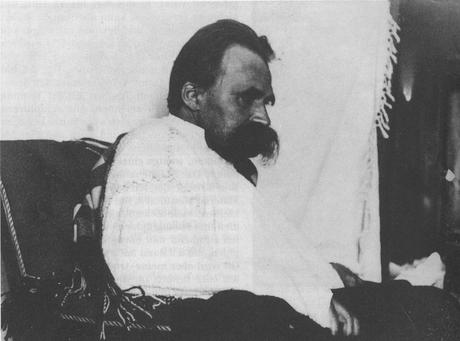
Would Nietzsche say, as is often said of him, that there is no Truth? Would he deny that there might be objective Truth, or absolute Truth (Truth as I capitalize it)? Certainly not, and while maybe hidden, or obtained through other than normal cognitive means, I don’t think he would have denied that there might be something else, a noumena behind the phenomena. Furthermore, he clearly intended his works to be taken seriously, as contributions to what we call knowledge. All these factors taken together go a long way to supporting the claim that Nietzsche ought to be seen as the first genuine existentialist.
Being an existentialist, let’s remember, was a label all the greatest existentialists either never heard about in their time, or flat-out denied being (sic.), existentialism being really unknown until 20th century philosophical historians started using it to pigeon-hole certain thinkers of the past. A true existentialist refuses to be labeled anything including “existentialist”. The thesis writers and other wiseacres in their rush to categorization have divided these existentialists into atheistic and theistic branches, a difference which really comes down to how one would define theism, and God. The greatest of all modern philosophies in my opinion – a kind of almost “anti-philosophy” we could say – existentialism is the ultimate humanism and begins all inquiry always from a standpoint originating with a human individual. The distinction between subjectivity and objectivity itself relies on this primordial subjective human nature. While we might debate about its origins and growth, any informational sustenance we might consume in our lives is directly placed before us, and so in a sense produced, by human individuals; our guiding mental dietary principle, as we peruse the menus of offerings and buffets of choices the Restaurant of Life presents us, should be to fill our vessels with only carefully selected choices from among the myriad of recipes that come to our attention.
The goal for the existentialist, perhaps one thing common to all existentialists, is what is called “authenticity”, the never-ending process of improving one’s self, the refusal to abide by any system unless abiding by that system be the best choice at the time. It is a plucking from among the palette of life’s known epistemological and ontological colors those hues which are most expressive of our individual nature, a crystallizing of one’s singular self from the vague field of commonality. Last chapter we discussed the problems with the herd mentality, the tendency to ideological adherence that inhibits Truth and its pursuit. An objectivity might very well exist, but discovering such a point of view requires being completely unprejudiced and uninfluenced by prior conditioning. The difficulty of achieving this true objectivity, and whether Nietzsche thought such an objectivity is possible at all, is where he is most misunderstood.
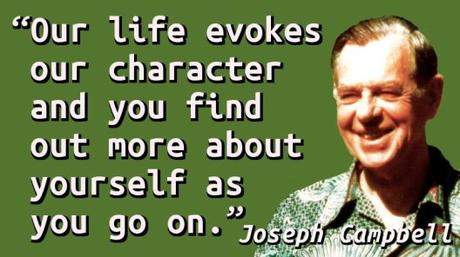
As I say, Nietzsche believed in Truth, and, he believed in a God. Were it not for humanity, or more accurately, certain human individuals forging ahead, thrusting their unique selves into the world, all language, discovery, invention, creation, and myth would never come to be. He made the world awaken to the fact that being “different” is neither heretical nor “bad” by anomaly alone, despite it being seen as such by the masses and herds. This is why he preferred myths over science when it comes to matters of God and the Spirit:
Every culture that has lost its myths has lost, by the same token, the natural, healthy creativity…Only a culture ringed about with myths can unify a culture…
Here we have our present age, the result of a Socratism bent on the extermination of myth…
[and extremely important for us here…]
(…) underneath the hectic movements of our civilization, there dwells a marvelous ancient power, which arouses itself mightily only at certain grand moments and then sinks back again to dream of the future. (Birth of Tragedy, 136-138, my emphasis).
Nietzsche, therefore, would seem to believe in not just a “marvelous ancient power”, or simple Prime Mover, but a power that dwells, and moves, and thinks. There is much to evidence Nietzsche’s belief in the Power of Myth and Myths To Live By as explained by Joseph Campbell.
There are for Nietzsche, however, drawbacks and limitations to using myths as rational explanations for what exists and what occurs to us in the world, namely whenever these myths try to reduce Life to some sort of punishment, downgrade it to be something despised in lieu of an afterlife, in short when they serve to deny Life. The Romanized Christianity named after Jesus of Nazareth he saw as being such a denial.
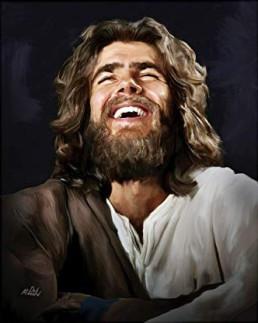
In Genealogy Of Morals, and speaking of Schopenhauer, Nietzsche explains:
[Human, All Too Human] was an attack. The point at issue was the value of the non-egotistical instincts, the instincts of compassion, self-denial, and self-sacrifice [I might add, patience…], which Schopenhauer above all others had consistently … “transcendentalized” until he came to see them as absolute values allowing him to deny life and even himself. (153-154)
Would, or should, God have Man’s purpose on Earth be primarily suffering and self-denial? Nietzsche thought Life should be something celebrated, enjoyed, by which celebrations and pleasant experiences we rejoice in and prove the goodness of Life and God. He continues:
It was here [denial of Life, Life as punishment…] that I sensed the greatest danger for humanity…here I sensed the beginning of the end, stagnation, nostalgic fatigue, a will that had turned against life. (154)
The God of Nietzsche is erroneously called “dead” or “non-existent because his critics have misread his criticism of Christianity as an endorsement of atheism and worse, nihilism, both charges for which, were he alive, I would recommend a slander suit:
This should take care once and for all, of the origin of “Our Holy Lord” – a single look at the Greek gods will convince us that a belief in gods need not result in morbid imaginations, that there are nobler ways of creating divine figments – ways which do not lead to the kind of self-crucifixion…in which Europe, for millennia now, has excelled. (227)

I am reminded of trip to Quito, where I spent some time visiting a church museum in what I was told would be Christian art. Large room after large room, gallery after gallery, six at least with dozens of paintings in each place – I am not sure how many more there were as I didn’t make it through them all, so nauseous from what I saw I had to leave – there were pictures of a dying Jesus, with more blood and guts and sadness than any modern slasher movie. This is kind of how Nietzsche viewed this religion, exactly as portrayed by those well-meaning painters, who in their desire to evoke sympathy for their savior instead in the end wound up evoking, in me for one, only feelings of hate, evil, murder, strife, sadness, skepticism, and bloodshed. Christianity to this day, in some ways, does seem to deny humans good conscience after following natural passions, for wanting to forge ahead from the crowd, by pursuing uniqueness, or pride, or power, or self-assertions of any unconditioned type, for language of a type, for not following the rules of men. Christians do not hang in their homes pictures of a smiling, happy, rejoicing Jesus, or with any frequency a Jesus of caring and compassion. What you see, and taken as symbolic of deity no less, is a sad scene of a human impaled on a cross.
It is not God “proper” that caused Nietzsche to feel the need to write the Anti-Christ, or write period, but rather it was the particular Roman-ized, Medieval, fire-and-brimstone corruption of godhead, and its accompanying denial of Life, that he felt to be anti-God, whose believers he would in subsequent works talk about as those who need to “go down”. The anti-Christ of Nietzsche will be the one who convinces the world they have been duped into following and worshiping a sham god. When that day comes, he said:
The will [will be] free once more and restore to the earth its aim, and to man his hope; this anti-Christ and ant-nihilist, must come (Portable Nietzsche, op. cit., 600 et. seq., my emphasis).
More than believing in God, Nietzsche, I dare say, was as “God-intoxicated” a man as was Spinoza, or Descartes. The Christianity he saw practiced was, to his eyes, actually an evil practice, anti-religious in basic structure and contrary to his, and most of antiquity’s conception of God. His anti-Christ, whatever the other axe-to-grind critics will tell you, is really he who aims to destroy anti-religious sentiment and its life-denying influences perpetrated in God’s name.
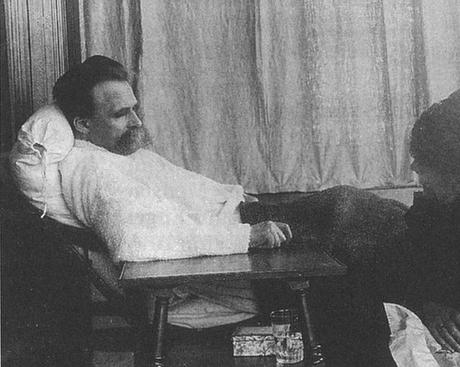
VIII. Thus Spoke Nietzsche
With his introduction of his main character in Thus Spoke Zarathustra Nietzsche unleashed the prophecies of his allegorical messiah onto a European people he saw as being incessantly and ever more frequently mesmerized by what he considered to be a dogma contrary to Life. In Twilight Of The Idols (In Kaufmann, op. cit., 467) he quipped:
In our own wild nature we find the best recreation from our un-nature, from our spirituality.
The profundity of this statement can not be underestimated, and books could be written, indeed some have been written, in effort to accurately decipher it. In this quote we have a postulation saying that each of us individuals is composed of two aspects, a dualism consisting of 1) a wild nature and 2) an un-nature, which he treats here as synonymous with spirituality. I look at this simply as the stereotypical angel on one shoulder and the devil on the other, only they are indistinguishable by appearance alone. In every instance, at every moment of consequence in our lives, there is an inborn, automatic, instinctual, emotional, spontaneous aspect of our self, one which when negotiating each of these instances, events, and thought processes, must contend with the learned, societal, ethical, and other prohibitive and cautionary requisites of the spiritual aspects of one’s self. Every thing we see has an analog in our mind.
Notice that clearly Nietzsche is not eliminating the, or our, spiritual side. He is saying it has been misdefined, and misplaced, and erroneously given a weight more than the fifty percent maximum it ought rightly claim.
The evidence taken all together, we find that much evidence does exist to show that Nietzsche believed in a power beyond Man, and of a human, all too human spirituality. It seems to me the only defense for those who would continue to deny Nietzsche a feeling of transcendence or, as we have seen, “belief” in God, as we have so far presented the case, would be for them to argue that a belief in spirituality or “transcendent powers that think” does not necessarily imply a belief in God. I will respond to this objection in what follows.
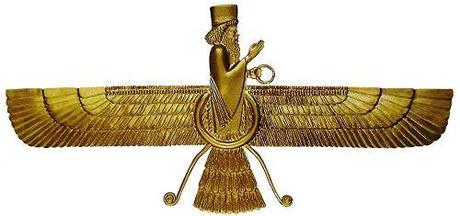
The real Zarathustra, or Zoroaster, is widely considered among scholars to be the founder of the first monotheistic religion. Zoroastrianism recognizes two aspects operating in the world, a good aspect and an evil aspect forever at odds with each other, but at the same time necessary for each other, a complementary arrangement symbolized most effectively by the yin-yang symbol of the Tao, and which came first is not so easy to say. Ormazd, or Ahura Mazda, you might envision as the light half of this dichotomy, and Ahriman, or Angra Mainyu (which I remember as “Angry Man”), as the dark half. As the light has dark aspects, and the dark has light, recalling the “dots” of the Tao symbol at least, as different as they are they have some commonalities, and it is no accident that like Siamese twins they are portrayed as inseparably joined together. Psychologically these are two aspects of one thing, two sides of the same coin, necessary for and dependent on each other. These forces, represented by Ormazd and Ahriman, or Yin and Yang, Good and Evil, Mental and Physical, transcendent and imminent, phenomenal and noumenal, relativistic and absolute, finite and infinite, all of them and thousands more such dialectical possibilities operate in our world, in Nature, and in our psyches and decisions. Nietzsche’s choice of Zarathustra as his largest work’s protagonist is to illustrate by historical example the necessary progression of spirituality, the human spirit.
Those who object and say someone who believes in spirituality, and transcendence, and in the existence of a thinking entity which fiddles around with the world does not believe in God must be using a specific definition of deity, and insist God is of some pre-determined, human-constructed, or otherwise anthropomorphic type of God, perhaps the kind who casts thunderbolts at evildoers and relegates transgressors he can foresee nevertheless to hell, and who at other times is like Nero, and declares favorites, rejoices in polygamy, and strums a lyre. In the historical context, which I only summarized here, spiritualism has been the heart of the human condition. If we consider the words of the great modernist thinkers, of which Nietzsche was one (as I have also demonstrated here, particularly for the Derrida and “deconstruction” types, he was no “post-modernist”…), we might even say it is the human condition. God and His existence were central to their thoughts.
Witness the paradox of this maxim:
There is a hatred of lies and simulation, stemming from an easily provoked sense of honor. There is another such hatred, from cowardice, since lies are forbidden by divine commandment. (ibid. 471)
This witticism would serve well when discussing all types of values, values which Nietzsche felt had by his time become corrupted, altered in meaning, and in need, like the currency from time to time, of revaluation. Christianity under penalty of death is irreligious on any grounds, as democracy by force is fascism nonetheless. What things are supposed to mean and what they mean change over time and through corruption.
Here in this quote we see evidence of the perennial philosophy talked about by Huxley, philosophical thought at least as old as Aristotle, regarding here the difference between learning true virtue by experience and sham virtue by coercion and law. Discussing the education of children, Aristotle talked about how to teach kids not to steal, and said that teaching children not to take what belongs to others for fear of punishment alone does not cause them to learn true respect for another’s property, or the larger virtue that we know as something like the Golden Rule, or the first form of Kant’s Categorical Imperative. Over two thousand years ago Aristotle made it clear that only when the child learns why he should not steal, independently of any punishment for non-compliance, does that child learn the virtue. When one does what is right to do, in any given instance, one either does so because one wants to do what is right, or one does so to avoid a punishment. The second type is based on fear, or cowardice, on what would happen if you did what you really wanted to do, or reacted how you were first inclined to react. These two types of virtue are what is discussed in this maxim by Nietzsche.
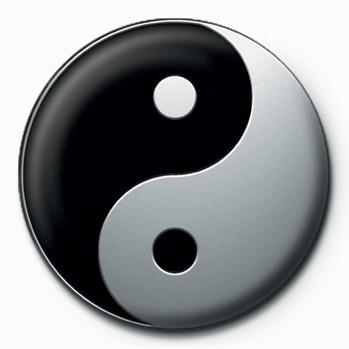
There are those who hate lying because it hurts their dignity (“How dare he try to treat me like an ignorant fool..!”), or because saying what is known to be untrue compromises the reality of what ought be said, or because it misrepresents everything and everyone involved, or because, well, what would happen if everywhere people just lied, or how would you feel if I lied to you, etc. Conversely, there are some who believe that lying is wrong, but just because “it is said” to be wrong, or because of fear of being caught in the lie, or because God said so, or because they might go to hell. In all these latter cases, the real virtue goes unlearned. When all one needs to do is preface “God said” in front of something, and people will obey, then –
The concept of God becomes a tool in the hands of priestly agitators…everything else that is unnatural follows: a God who demands in place of one who helps, who devises means, who is at bottom the word for every happy inspiration of courage and self confidence. (Kaufmann, op. cit., 595)
When Zarathustra runs through the streets shouting “God Is Dead!”he is speaking to the people about this “God” who demands. Much of the criticism against Nietzsche comes from misreadings of Zarathustra by readers almost always unfamiliar with the rest of his works. Nietzsche loved Life, and, as Zarathustra relayed, he “loved Man”. Instead of aspiring to ideals above the clouds, more often than not the products of some human’s wishes and/or imagination, which ironically symbolize all that mankind cannot reach, Nietzsche believed we should take Life, embrace it, affirm it and ourselves, take charge and form for the future our own heaven on Earth. In this way we do not slander the Earth and its innumerable wonders, and honor the Creation by continuing in its image. By embracing what we have before us, and not worrying so much about the next life, or “the grass on the other side”, we can progress, and so take some charge of our own evolution, and at least make the world a better place for future generations. Denying Armageddon in this way, any foreseen theologically or otherwise metaphysically-propagated human catastrophe in the future will not be ordained by God, but rather if it does come it will be caused by certain individuals given the autonomy to govern human affairs.
How someone like Nietzsche could ever be considered as the icon for nihilism and atheism is almost incomprehensible, especially if you consider this charge is usually levied by those who see Earthly existence as a sort of punishment, and its beauties and pleasures as temptations to be avoided. It is these deniers of Life who fail to acknowledge the goodness of Creation, who deny Truth, and who spit in the face of the true God.

IX. Conclusion More Powerful Than a Locomotive
In The Anti-Christ and Zarathustra we find the definitive Dr. Nietzsche condensed, especially regarding his famous creation of the Superman, or the Overman (Übermensch):
Once the concept of “nature” had been invented as the opposite of God, “natural” had to become synonymous with “reprehensible”; this whole of fiction is rooted in hatred of the natural (of reality); it is the expression of a profound vexation at the sight of reality. (ibid. 582)
Before the Superman comes, the evolved human being who will surpass man, first must come the Last Man, the one born – through and evolutionary, hereditary, and otherwise natural and societal influences – to conform to the herd. We may know this Last Man because he will have separated the idea of God from the idea of Nature completely, so much so that they will become not, as in Zoroastrianism just antagonistic to each other, but as diametrically opposed, and now separate. Imagine the Yin and Yang symbol but each one apart from the other, where the circle has become split into two semicircles. When the Superman comes, he will reunite the severed halves, and put them back together as one, giving to each again the respect they deserve, but recognizing them as one and the same, as dual aspects of but one reality.
We experience God [unfortunately] not as “god-like”, but as miserable, as absurd…as a crime against life. We deny God…in a formula: “Deus qualem Paulus creavit dei negato”. (ibid. 627)
Indeed, for Nietzsche, God as created by Paul is the negation of God as traditionally conceived. The Superman is he who must come to destroy all religion that denies Life.
Thus Spoke Zarathustra is Nietzsche’s parable for demonstrating his desire to have Man reserve his worship and reverence for the Life-giving, helping, understanding God, the deity we can feel and hear in our conscience if not express nor define with our words, this inexplicable nature of God being also thousands of years old, at least from Plato, and indicative of the global, eternal religions, believed in for eons, by peoples from all over the world.
In conclusion, would you say Nietzsche believed in God? Was he atheist, or nihilist? I think these charges may only be levied at him by those who believe in Christianity, the Christianity taken over by the Romans and which later established the papacy. For even them, though, whether the charges are legitimate will depend on the definitions used. If belief in God means accepting myths and fables and things like revelations as being literally true, and requires that one must deny the flesh, and life, and pleasures, or that one must participate in quasi-cannibalistic rituals and speak mantric prayers and rites, or if one needs to be ascetic in thought and actions to be considered good to God, then clearly he did not. But if believing in God means using our will to exert God’s influence into the world, or striving to better ourselves, or respecting but loving the Life given us, or following the inspirations of our hearts and minds, or embracing the beauteousness and miraculousness of Life, and if it means recognizing a Life ripe for human invention and creation for purposes and results both good or bad, and if you define God as equivalent to, or creator of, the Good, and Love, and Reason, and Virtue, and the Logos, and Nature, and so on, an essence the origin of, yet distinct from our physical existence, then Nietzsche not only believed in God, he was also a saint.
